中西方文化的比较Comparison between Confucius and Socrates
东西方宗教文化差异(英文版)
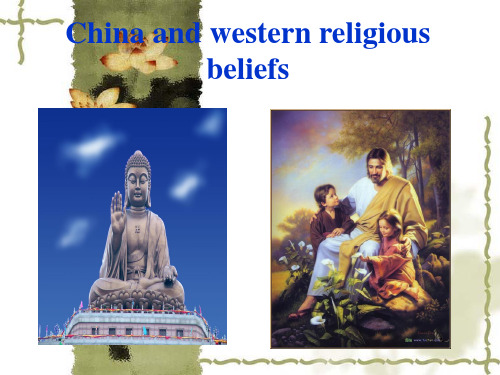
The Similarities
They have the same background, the Christian was created When the Jews were ruled by The Roman Empire, Jews look forward to a person just like the farseer said who can take them moving towards freedom. While China, Confucianism and Taoism are created when the people were suffering in pain during the Warring States period,
In the early human social, Religious includes world explanation, judicial, moral cultivation and mental comfort, and other functions. In modern society, science and judicial have separated from some religious, but the moral training and mental comfort function will continue to exist. Religion’s belief systems and social groups are an important part of human thought culture and social form.
Therefore after the formation of Christianity it gradually established a fixed, unified values and outlook on life. Those are met with the religious teaching, whether the regulation or the modern thoughts can not be divorced from the relationship with this religious. In practice, Christianity also starting from system to establish unified church organization such as church in urban and rural areas for christians to pray.
中西方文化的比较Comparison between Confucius and Socrates
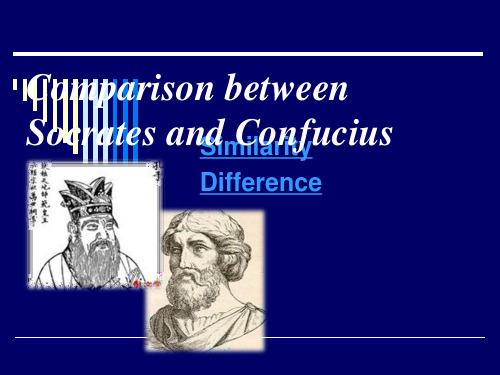
ignorance is evil”.(知识即美德) He focus on self-development , personal virtue . The combination of wisdom and virtue.
3. Confucius Institute and Confucius Classroom---by 耿柳
Socrates
1.He was a great philosopher , opened a new direction of ancient Greek philosophy and made the philosophy became a knowledge to study the human. 2.Socrates taught Plato ,who taught Aristotle ,the three of them were the greatest men in ancient Greek
---by 安琳琳
philosophy
Confucius : Individual obedience to the whole. (个体服从整体)
Socrates : Respect for individual , emphasize the freedom of humanity. (尊重生命个体,追求人性自由)
Educational aim------national benefit VS personal accomplishment
Educational style-----receiving students VS lobbying
Comparison between Confucius and Socrates

Good morning, boys and girls. Today I would like to talk about two of the greatest philosophers during the history, Socrates and Confucius. As we all know, the two person influenced the world to a large extent. I’ve divided my presentation into three main parts. I’m going to compare them in their lives, philosophies and I want to conclude their influence to the world. Right, let me get started.About 2,400 years ago in Athens, a man was put to death for asking too many questions. He is Socrates. As a young man, he had been a brave soldier fighting in the Peloponnesian War against the Spartans and their allies. In his middle age, he shuffled around the market place, stopping people from time to time and asking them awkward questions. Almost at the same time, twenty-five hundred years ago, Confucius was born in China. Different from Socrates, he had to earn his living at tasks that bordered on the menial. And when he grew up, he became a teacher and then left his country to travel a number of states. After the long-term trip, he returned his home and kept teaching until he died.Different environments made the two philosophers’ different thoughts. During Socrates’ questioning over and over again, he demonstrated that people he met in the marketplace didn’t really know what they thought they knew. He loved to reveal the limits of what people genuinely understood, and to question the assumptions on which they built their lives. Wisdom for Socrates was not knowing lots of facts, or knowing how to do something. It meant understanding the true nature of our existence, including the limits of what we can know. Life, he declared, is only worth living if you think about what you are doing. While Socrates strived for wisdom by asking questions, Confucius was dedicated to advocating social and political reforms that could promote the welfare of the common people. The conditions of his times were intolerable. There was little law and order. The common people’s position was even tragic: They had no security because they had no power. Confucius decided to devote his life to trying to right them. He never believed men’s struggling was nature state of society. On the contrary, he thought that men should cooperate to promote the common welfare. He believed a successful ruler should bring about the welfare and happiness of his people instead of amassing wealth and power for himself. People say, there were philosophers before him, but it was with Socrates that the subject real took off. If philosophy has a patron saint, it is Socrates. His questioning still impact what philosophers do today. He was one of the key figures in the Western philosophical tradition. Meanwhile, Confucius had equal influence in Chinese philosophy. Within a few centuries after his death, hereditary aristocracy had virtually ceased to exist in China, and Confucius had contributed more than any other man to its destruction. His thoughts also played a role of some importance in the development of democratic ideals in Europe and in the background of the French Revolution. Through French thought it indirectly influenced the development of democracy in America.So, to sum up, through the learning of Socrates and Confucius, we can attain so many meaningful knowledge and methods to think. Socrates told us an un examined existence is all right for cattle, but not for human beings. Just think about what Confucius advised us, it’s never too old to learn. That brings me to the end of my talk. Thank you for listening.。
中西方文化比较智慧树知到课后章节答案2023年下西华大学

中西方文化比较智慧树知到课后章节答案2023年下西华大学第一章测试1.In Greek myths, why was Prometheus punished by Zeus?A:Because he wanted to be the ruler of heaven. B:Because he had an affairwith Hera. C:Because he stole fire from Zeus and gave it to humans.D:Because he did not respect Zeus. 答案:Because he stole fire from Zeusand gave it to humans.2.What is the image of “Yan Di” in Chinese myths?A:He has a human’s body.000 B:He has a human’s body. C:He has a bull’shead. D:He has a horse’s body. 答案:He has a h uman’s body.;He has a bull’s head.3.Which of the following can be seen as the spirit of maritime civilizationreflected in Greek myths?A:boldness B:adventurousness C:thrift D:conservativeness 答案:boldness;adventurousness4.There are many Chinese mythical stories about the deities and culturalheroes related to agriculture such as________ and _________.A:Shennong B:Monkey King C:Houtu D:Nezha 答案:Shennong;Houtu5.In the Chinese cosmology of Yin and Yang, Yang is always given moreattention to and is thought to be superior to Yin.A:错 B:对答案:错6.Confucius is respected and worshipped in Chinese culture as a god becausehe claimed to be divine.A:错 B:对答案:错第二章测试1.Which of the following is NOT the distinct feature of western operacompared with Peking opera?______A:It is symbolic and suggestive. B:The singing is more flexible. C:The stage is large and elaborate. D:Performers’ voice ranges decide their roles. 答案:It is symbolic and suggestive.2.Which of the following is NOT true about Mei Lanfang?______A:He composed many new melodies. B:He created various dances. C:He made innovations to the facial makeup, hairstyles and costumes. D:He wrote some plays for Peking opera. 答案:He wrote some plays for Peking opera.3.The features of Gothic architecture could be mirrored in Gothiccostume,including______.A:pointed sleeves B:pointed shoes C:stiff-bodiced dresses D:high headdresses 答案:pointed sleeves;pointed shoes;high headdresses4.Ancient Chinese architecture features timber framework has severaladvantages, including______.A:vulnerable to fire B:time-consuming C:windows and doors would not berestricted D:resistant to earthquakes 答案:windows and doors would notbe restricted;resistant to earthquakes5.Ancient Chinese buildings enjoy external appearance while westernbuildings attach importance to internal richness.A:错 B:对答案:错pared with traditional Chinese costumes, the rules on colors of westerncostumes are less strict and obvious.A:对 B:错答案:对第三章测试1.Chinesse poetry is good at using( ) to display imagery.A:implication B:blank space C:brush D:euphemism 答案:blank space2.Poetry is closely related to ( ).A:syntax B:diction C:stanza D:music 答案:music3.According to Aristotle, the function of tragedy can be concluded as ( ).A:ecstasy B:elevation C:repugnant D:catharsis 答案:catharsis4.Three main subjects in western fiction are about fantasy, ( )and( ).A:adventure B:death C:war D:love E:religion 答案:adventure;religion5.The Dream of Red Mansions is a typical history romance.A:错 B:对答案:错6.Chinese Peking opera usually uses symbolic performance on stage.A:对 B:错答案:对第四章测试1.What does "吃" mean in Chinese expression "吃不准"?A:to suffer B:to eat C:to understand D:to get 答案:to understand2.Which of the following statement is NOT true about eating in the west?A:Do not make slurping noises while sipping from a spoon. B:Always sip from the tip rather than the side of the spoon. C:Always sip from the side of thespoon rather than the tip. D:Do not make harsh noise by touching plates orcups with utensils. 答案:Always sip from the tip rather than the side ofthe spoon.3.Which of the following names does not belong to the praising type?A:燕窝福字什锦鸡丝 B:翡翠虾球 C:江山万代 D:龙凤呈祥答案:翡翠虾球4.Which of the following are the factors contributing to the development ofagricultural culture in China?A:human’s desire B:rich landforms C:oceanical environment D:favorableclimates E:continental movement 答案:rich landforms;favorable climates 5.There is no common point between Buddhism and Christianity.A:对 B:错答案:错6.As to fry, there are more kinds of subclassification in Chinese cooking than inthe western counterpart.A:对 B:错答案:对。
中西方文化比较英语作文
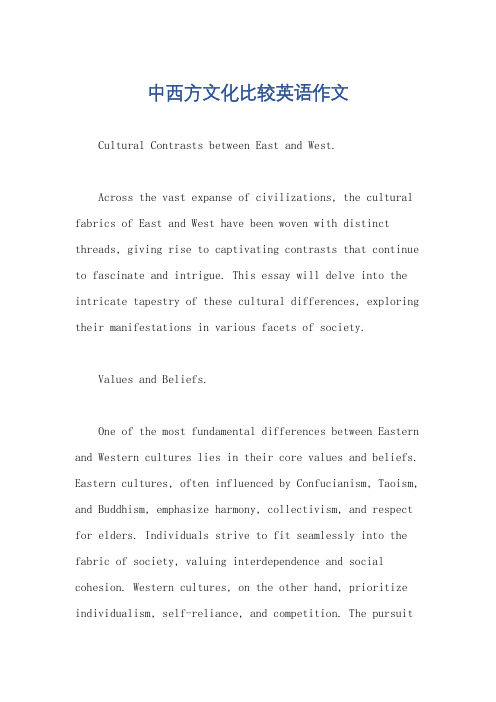
中西方文化比较英语作文Cultural Contrasts between East and West.Across the vast expanse of civilizations, the cultural fabrics of East and West have been woven with distinct threads, giving rise to captivating contrasts that continue to fascinate and intrigue. This essay will delve into the intricate tapestry of these cultural differences, exploring their manifestations in various facets of society.Values and Beliefs.One of the most fundamental differences between Eastern and Western cultures lies in their core values and beliefs. Eastern cultures, often influenced by Confucianism, Taoism, and Buddhism, emphasize harmony, collectivism, and respect for elders. Individuals strive to fit seamlessly into the fabric of society, valuing interdependence and social cohesion. Western cultures, on the other hand, prioritize individualism, self-reliance, and competition. The pursuitof personal success and self-actualization holds paramount importance.Communication Styles.The diverse cultural backgrounds of East and West have shaped contrasting communication styles. In Eastern cultures, communication tends to be indirect, nuanced, and context-dependent. Speakers often rely on subtle cues, gestures, and unspoken understandings. Western cultures, in contrast, favor direct and explicit communication. Speakers aim to convey their thoughts and ideas clearly and concisely, leaving little room for interpretation.Perception of Time.The perception of time reflects a profound cultural divide. Eastern cultures often view time as cyclical and fluid. Past, present, and future are interconnected, with the present being a transient moment within the grander scheme of existence. Western cultures, however, tend to perceive time as linear and irreversible. Time is seen as aprecious commodity that must be managed and utilized efficiently.Approaches to Education.Educational systems in the East and West differ significantly in their objectives and methodologies. Eastern education traditionally focuses on rote memorization, respect for authority, and the transmission of cultural traditions. Students are expected to conform to established norms and hierarchies. Western education, on the other hand, emphasizes critical thinking, creativity, and the development of individual potential. Students are encouraged to question, experiment, and explore new ideas.Social Stratification.Social stratification systems also exhibit contrasting patterns between East and West. Eastern cultures often maintain a hierarchical structure, with individuals assigned to specific social classes based on factors such as family background, social status, and economic wealth.Western cultures, while still exhibiting some degree of social stratification, have generally embraced greater social mobility and equality.Role of Religion.Religion plays a pivotal role in shaping cultural values and practices. In Eastern cultures, religions such as Buddhism, Confucianism, and Taoism have deeply influenced ethical systems, social norms, and artistic expressions. Western cultures, on the other hand, have been marked by a separation between church and state. While Christianity has been a major force in shaping Western values, its influence has declined in recent decades.Conclusion.The cultural tapestry of East and West is intricately woven with unique threads that create a vibrant and diverse world. The contrasts between these regions manifest themselves in a wide range of aspects, from values and beliefs to communication styles, perception of time,educational approaches, social stratification, and the role of religion. By understanding and appreciating these differences, we can foster cross-cultural dialogue, promote tolerance, and enrich our global society.。
中西文化对比英文作文
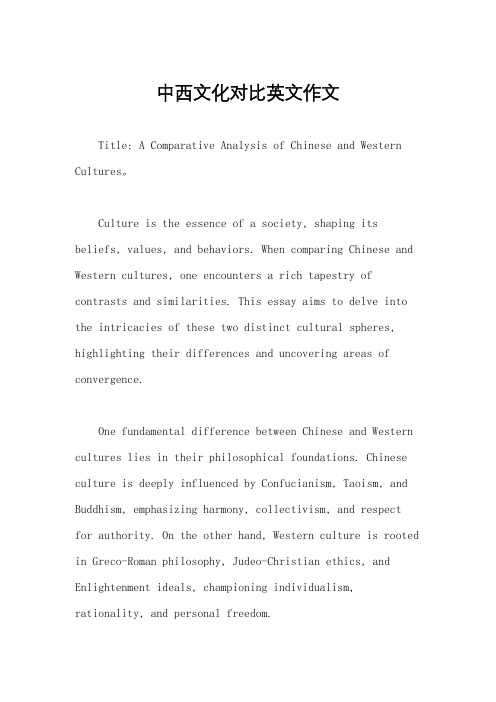
中西文化对比英文作文Title: A Comparative Analysis of Chinese and Western Cultures。
Culture is the essence of a society, shaping its beliefs, values, and behaviors. When comparing Chinese and Western cultures, one encounters a rich tapestry of contrasts and similarities. This essay aims to delve into the intricacies of these two distinct cultural spheres, highlighting their differences and uncovering areas of convergence.One fundamental difference between Chinese and Western cultures lies in their philosophical foundations. Chinese culture is deeply influenced by Confucianism, Taoism, and Buddhism, emphasizing harmony, collectivism, and respectfor authority. On the other hand, Western culture is rooted in Greco-Roman philosophy, Judeo-Christian ethics, and Enlightenment ideals, championing individualism, rationality, and personal freedom.Language is another pivotal aspect that distinguishes Chinese and Western cultures. Chinese, with its intricate characters and tonal variations, reflects the cultural reverence for tradition and symbolism. In contrast, Western languages like English, with their alphabetic scripts and diverse linguistic origins, mirror the dynamic and pragmatic nature of Western societies.Social organization and etiquette also differ significantly between Chinese and Western cultures. In China, hierarchical relationships and social harmony are paramount, manifesting in elaborate protocols for addressing and interacting with others. Conversely, Western societies tend to prioritize egalitarianism and direct communication, often valuing individual expression over conformity to social norms.Cuisine provides yet another lens through which to examine cultural differences. Chinese cuisine, with its emphasis on balance, texture, and symbolism, reflects the holistic approach to health and well-being ingrained inChinese culture. In contrast, Western cuisine, characterized by diverse flavors and culinary experimentation, embodies the spirit of exploration and innovation prevalent in Western societies.Religious beliefs and practices also vary between Chinese and Western cultures. While China has a rich tapestry of religious traditions, including Buddhism, Taoism, and Confucianism, it also exhibits a secular outlook shaped by decades of Communist rule. In contrast, Western societies are predominantly Christian, with diverse denominations and varying degrees of religious observance.Art and aesthetics offer yet another fascinating arena for cultural comparison. Chinese art, with its emphasis on symbolism, harmony, and nature, reflects the philosophical underpinnings of Chinese culture. Western art, characterized by realism, individual expression, and innovation, embodies the spirit of creativity and exploration that defines Western societies.Education is yet another realm where Chinese andWestern cultures diverge. In China, education is highly valued and seen as a means to upward social mobility, leading to intense competition and emphasis on rote memorization. In contrast, Western education systems prioritize critical thinking, creativity, and holistic development, aiming to nurture well-rounded individuals capable of adapting to an ever-changing world.Despite these differences, Chinese and Western cultures also share commonalities and points of convergence. Both value family and community, albeit expressing it in different ways. Both appreciate art, literature, and music as vehicles for self-expression and cultural enrichment. Moreover, globalization and intercultural exchange have led to increasing hybridization and mutual influence between Chinese and Western cultures, blurring the lines and creating new cultural forms and expressions.In conclusion, the comparison between Chinese and Western cultures reveals a complex interplay of differences and similarities, each enriching the global tapestry of human civilization. By appreciating and understanding thesecultural nuances, we can foster greater cross-cultural understanding and collaboration in an increasingly interconnected world.。
中西方文化的比较comparison between Chinese mythology and Greek mythology
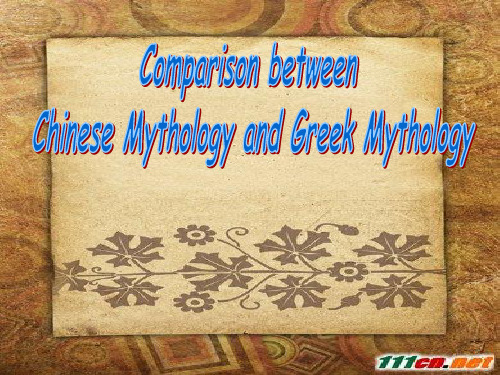
• The origin of human being There is a similar statement that is human was formed by clay. In chinese myths ,Nuwa created human with clay. In Greek myths human was created by Prometheus.
Athena competes embroidery with human, when she lost it, she felt angry and turned people into spiders. Zeus has many illegitimate children. While these kinds of things will never happen in Chinese gods.
reflect the spirit of self-sacrifice
bloody
Similarities
• 1.The tendency towards Monarchical Power. • In Greek Mythology, Zeus has the supreme power while in Chinese Mythology Emperor Jade is the ruler of Heaven.
systematic not complete but why? culture background unification(early) late writer(poet,pilgrim) (politician,philosopher)
Differences
• • • • • greek myth chinese myth
中西文化比较 第2版 unit 8 The Chinese and Western Painting
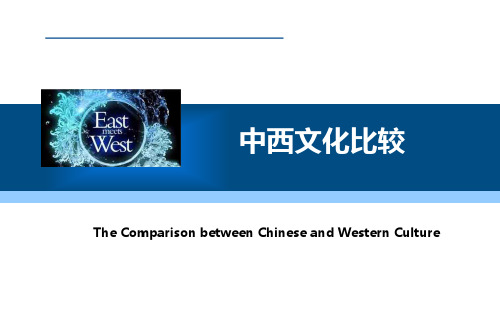
② She has a very even temperament. 她的性情非常平和。
② Experience of pedagogy is not only an activity but also the result of this activity. 教育学范畴内的体验,既是一种活动,也是活动的结果。
5
Text A
Notes
2. temperament n.
a person’s or an animal’s nature as shown in the way they behave or react to situations or people
① The thought of war is too awful to contemplate. 战争太可怕了,真不敢去想。
② The consequences would be too ghastly to contemplate. 后果不堪设想。
10
Text A
Notes
7. meticulous adj.
3
Vocabulary Extension
4
Text A
Notes
1.பைடு நூலகம்pedagogy n.
Pedagogy is the study and theory of the methods and principles of teaching.
① The pedagogy and economics have different ideas and visual angle. 教育学与经济学具有不同的观点与视角。
- 1、下载文档前请自行甄别文档内容的完整性,平台不提供额外的编辑、内容补充、找答案等附加服务。
- 2、"仅部分预览"的文档,不可在线预览部分如存在完整性等问题,可反馈申请退款(可完整预览的文档不适用该条件!)。
- 3、如文档侵犯您的权益,请联系客服反馈,我们会尽快为您处理(人工客服工作时间:9:00-18:30)。
---Reflect the humanistic spirit
---Pay attention to people and human nature ---Take moral as the basis of political will
---by 张晓楼
· Attach great importance to the people's moral quality cultivation
---by 安琳琳
Confucius emphasized on individualized and
Politics
through “rites”(礼)people’s natural morality; Autocratic monarchy(君主集权制) Concept of class (阶级观念) Socrates believed that the philosopher is the only type of person suitable to govern others,according to the law. He openly objected to the democracy.
Similarity Difference
—by刘璐
The similarities
Historical background
Many wars
Culture and minds active
Poor families
—by刘璐
1 They stress that everyone is equal before education.(有教 无类)
---The possibility and necessity of the people to accept education ---Education play an important role in the development of people ---Any leader must have a wide range of knowledge.
---by 白明月
Ethic
emphasized self-cultivation(个人修养). What you do not want done to yourself, do not do to others. 己所不欲,勿施于人。 Socrates advocated “knowledge is virtue while ignorance is evil”.(知识即美德) He focus on self-development , personal virtue . The combination of wisdom and virtue.
---Stress people should have a certain virtue. ---Advocate benevolence and kindness
---by 张晓楼
Advocate cultivating talents on the rule of
having both ability and political integrity
---by 张晓楼
Aim,style,content Philosophy Impact
Death
Educational aim------national benefit VS
personal accomplishment Educational style-----receiving students VS lobbying Educational content-----do not depend on God VS depend on God
---by 安琳琳
Confucius : the best government is one that rules
Confucius : Individual obedience to the
whole. (个体服从整体) Socrates : Respect for individual , emphasize the freedom of humanity. (尊重生命个体,追求人性自由)
---by 耿柳
Confucius died of disease when he was 73years old .
Socrates He was sentenced to death by the government because he did not believe the God and to bewitch the young people
---by张瑶
2
heuristic education(启发式教育)
---by张瑶
A.ask questions
B.initiative study(主动性的学习) C.thinking
---by张瑶
The human and the society as the topic to
explore
---by 耿柳
---by 白明月
Confucius advocated benevoistic teaching, get the knowledge across to others. Teach students according to their aptitude. 因材施 教 Socrates :midwifery teaching method(产婆术). Pay attention to guide students.
---by 耿柳
Socrates
1.He was a great philosopher , opened a new direction of ancient Greek philosophy and made the philosophy became a knowledge to study the human. 2.Socrates taught Plato ,who taught Aristotle ,the three of them were the greatest men in ancient Greek
---by 安琳琳
1. Confucius founded the Confucianism 2. the Four Books 《大学》《中庸》《论语》
《孟子》 the Five Classics 《诗经》《书经》《易》 《礼记》《春秋》 3. Confucius Institute and Confucius Classroom
